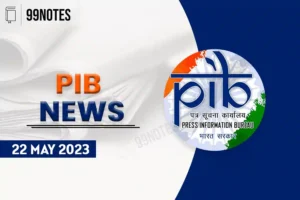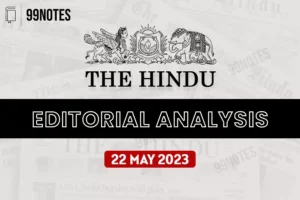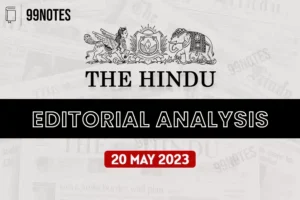24 May 2023 : Daily Current Affairs
DAILY CURRENT AFFAIRS
- DAILY CURRENT AFFAIRS
- 1. India-Australia ties built on trust: Modi
- 2. The Telangana- A.P. water dispute
- 3. What is the E.U.’s carbon border adjustment mechanism?
- 4. What counts is seldom counted: how the Census data remains under-utilised
- 5. ‘73% Smart City projects completed.’
- 6. India gives Bangladesh essential rail infra.
- For Enquiry
24-May-2023
Daily Current Affairs For UPSC ,Daily Current affairs of The hIndu and Indian Express.
1. India-Australia ties built on trust: Modi
Topic: GS2 – International relations
Context:
-
-
-
Prime Minister Narendra Modi and his Australian counterpart Anthony Albanese addressed the Indian diaspora at a mega event in Australia.
-
The foundation of India-Australia relations was highlighted as being based on mutual trust and respect.
-
-
Issue:
Significance of India-Australia relations:
-
-
-
Strategic Partnership: India and Australia share a strategic partnership based on shared democratic values, mutual interests, and a commitment to regional security and stability. The partnership has strengthened over the years, leading to enhanced cooperation in various areas.
-
Economic Ties: The economic relationship between India and Australia has witnessed considerable growth. Both countries have a strong focus on trade and investment. Australia is rich in natural resources, including coal, minerals, and agricultural products, which are in demand in India. On the other hand, India offers a vast market for Australian goods and services.
-
Bilateral Trade: Bilateral trade between India and Australia has been expanding steadily. Both countries have implemented measures to facilitate trade and investment, such as the Comprehensive Economic Cooperation Agreement (CECA) negotiations. The trade relationship encompasses sectors like minerals and energy resources, education, agriculture, technology, and services.
-
Defence and Security Cooperation: India and Australia engage in defence and security cooperation to address common security challenges and maintain regional stability. This includes joint military exercises, information sharing, and maritime security cooperation. The Quadrilateral Security Dialogue (Quad), which includes India, Australia, the United States, and Japan, further strengthens security ties in the Indo-Pacific region.
-
People-to-People Exchanges: The Indian diaspora in Australia and the Australian diaspora in India contribute significantly to people-to-people exchanges. Cultural ties, educational exchanges, and tourism play a vital role in fostering mutual understanding and strengthening bilateral relations.
-
Regional Engagement: India and Australia actively engage in regional forums and organizations, such as the Association of Southeast Asian Nations (ASEAN) and the Indian Ocean Rim Association (IORA). Their collaboration aims to promote regional stability, economic integration, and maritime security in the Indo-Pacific region.
-
Environmental Cooperation: India and Australia collaborate on environmental issues, particularly in areas like climate change, renewable energy, and sustainable development. Both countries recognize the importance of addressing environmental challenges and work together to find solutions.
-
-
2. The Telangana- A.P. water dispute
Topic: GS2 – Inter-state relations / Water disputes
Context:
-
-
-
The Krishna River water dispute between Andhra Pradesh (A.P.) and Telangana has remained unresolved since the bifurcation of the combined State in 2014.
-
-
Issue:
-
-
-
The dispute originated from the formation of Andhra Pradesh in 1956, where a Gentlemen’s Agreement was signed to protect Telangana’s interests in the utilization of water resources. However, the focus on irrigation facilities favoured Andhra, leading to discontent in Telangana.
-
In 1969, the Bachawat Tribunal (KWDT-I) was established to settle the water share dispute among Maharashtra, Karnataka, and Andhra Pradesh. The Tribunal allocated 811 tmcft of dependable water to Andhra Pradesh, which was later apportioned between Andhra and Telangana in a 512:299 tmcft ratio.
-
After the bifurcation, there was no specific mention of water shares in the Andhra Pradesh Reorganisation Act of 2014. An ad hoc arrangement was made for water sharing between Telangana and Andhra Pradesh in a 34:66 ratio, subject to annual review.
-
Telangana has been advocating for an equal share of water, citing global practices and basin parameters and pointing out water diversions by Andhra Pradesh from within Telangana’s basin.
-
Andhra Pradesh has also sought a higher share of water to protect the interests of its developed command areas.
-
The central government has convened meetings of the Apex Council but has not made significant progress in resolving the issue. The Ministry of Jal Shakti suggested referring the matter to a tribunal, but no action has been taken yet.
-
Telangana withdrew its petition from the Supreme Court based on the assurance that the water shares issue would be referred to a tribunal. Still, there has been a delay in the central government’s action on this matter.
-
-
3. What is the E.U.’s carbon border adjustment mechanism?
Topic: GS3 – Environment conservation
Context:
-
-
-
The Carbon Border Adjustment Mechanism (CBAM) is a tool signed by the European Commission to put a price on carbon emitted during the production of carbon-intensive goods entering the E.U.
-
-
Issue:
-
-
-
The Carbon Border Adjustment Mechanism (CBAM) – Its primary objective is to prevent carbon leakage, where E.U. manufacturers move production to countries with less stringent climate policies, resulting in more carbon-intensive imports replacing EU-manufactured products.
-
Starting from 2026, importers in the E.U. would need to purchase carbon certificates corresponding to the carbon price that would be applicable if the product was produced in the E.U. If a non-EU producer already pays a carbon price or tax, the corresponding cost would be deducted from the E.U. importer.
-
The CBAM aims to encourage producers in non-EU countries to adopt greener manufacturing processes and ensure a level playing field between imports and E.U. products.
-
The measure is part of the broader European Green Deal, which aims to reduce carbon emissions by 55% compared to 1990 levels by 2030 and achieve climate neutrality by 2050.
-
Concerns have been raised by countries, including India, about the potential impact of the CBAM. The sectors initially targeted by the mechanism, such as cement, iron and steel, aluminium, fertilizers, electricity, and hydrogen, could affect countries like Russia, China, Turkey, India, Brazil, South Africa, and Mozambique.
-
While India’s exports in the affected sectors represent less than 2% of its total exports to the E.U., the long-term impact could be severe. As India’s exports and the scope of the CBAM expand, the higher carbon intensity of Indian products could result in proportionally higher carbon tariffs, making Indian exports less competitive.
-
The joint statement during the EU-India Trade and Technology Council indicated that the two sides agreed to intensify engagement on carbon border measures, suggesting further discussions and negotiations on the issue.
-
-
4. What counts is seldom counted: how the Census data remains under-utilised
Topic: GS1 – Indian population/Census.
Issue:
-
-
-
The regular Census in India has been postponed indefinitely due to the pandemic, while debates about conducting a caste census are ongoing.
-
The potential of Census data remains untapped as limited information is collected, and the data need to be more utilized or utilized in policymaking.
-
Large-scale surveys funded by the Government of India provide a more detailed analysis of socio-economic issues, making the Census serve primarily as a framework for designing these surveys.
-
The release of Census data is delayed due to government regulations and concerns about political agendas, which diminishes its significance.
-
The Census has lost its potential relevance as alternative sources of information and bureaucratic regulations have limited its impact.
-
Interpolation, extrapolation, and exploration of demographic attributes in the Census data can provide valuable insights into population dynamics and future trends.
-
The primary axes of disaggregation in Census data are residence, age, gender, administrative units, Scheduled Castes and Scheduled Tribes, and religion, but their use for intervention purposes should be based on objective criteria rather than ascribed attributes like caste and religion.
-
Counting achieved identities and modifiable characteristics like education, profession, land ownership, and consumer durables is more progressive than counting ascribed identities.
-
Adversities and interventions should be focused on addressing the adversity itself, irrespective of its associated identity.
-
Examining failures in entitlements and circumstantial differences can be more effective in designing interventions and addressing concerns.
-
Counting alone is insufficient, and elastic characteristics are key to bringing about change.
-
-
5. ‘73% Smart City projects completed.’
Topic: GS1 – Urbanisation, GS3 – Infrastructure
Context:
-
-
-
Over 90% of the funds allocated under India’s Smart Cities Mission (SCM) have been utilized so far.
-
-
Issue:
-
-
-
73% of the projects under the mission have been completed.
-
As of May 1, a total of ₹38,400 crore has been released under the mission, and ₹35,261 crore has been utilized.
-
The SCM has around 7,800 projects worth ₹1.8 lakh crore, of which more than 5,700 projects worth ₹1.1 lakh crore have been completed.
-
The remaining projects are expected to be completed by June 30, 2024.
-
The mission has received a one-year extension.
-
Only 22 out of 100 cities have completed all the projects commissioned under the SCM.
-
The implementation of the mission is monitored by an Apex Committee headed by the Secretary of the Ministry of Housing and Urban Affairs.
-
A Smart City Advisory Forum (SCAF) has been established at the city level to facilitate stakeholder collaboration.
-
Each smart city has a Special Purpose Vehicle (SPV) responsible for planning, implementing, and managing the Smart City development projects.
-
-
6. India gives Bangladesh essential rail infra.
Topic: GS2 – International relations
Context:
-
-
-
The Ministry of Railways in India has handed over 20 broad-gauge locomotives to Bangladesh.
-
-
Issue:
-
-
-
The locomotives have been modified to suit the requirements of Bangladesh Railway.
-
These locomotives will help handle the increasing volume of passenger and freight train operations in Bangladesh.
-
The Indian government has offered Bangladesh the use of the I.T. system deployed by the PM-GATI SHAKTI scheme, which provides detailed information based on satellite imagery to streamline planning.
-
In June 2020, India provided 10 locomotives to Bangladesh as a grant.
-
The Indian Railways is crucial in improving rail connectivity and trade between India and Bangladesh.
-
Trade between the countries via rail has been growing consistently, with approximately 100 cargo trains exchanged per month.
-
The previous financial year sent around 2.66 tonnes of cargo to Bangladesh.
-
-
For Enquiry

24 May 2023 : Daily Current Affairs

23 May 2023 : PIB

23 May 2023 : The Hindu Editorial

23 May 2023 : Daily Current Affairs

22 May 2023 : PIB

22 May 2023 : Daily Current Affairs

22 May 2023 : The Hindu Editorial

20 May 2023 : PIB

20 May 2023 : The Hindu Editorial

20 May 2023 : Daily Current Affairs
Daily Current Affairs 24 May 2023 : Daily Current Affairs The Hindu Editorial
12-May-2023
Daily Current Affairs For UPSC ,The Hindu Editorial Summary
Facebook-f
Twitter
Youtube
1.Marriage…
PIB 23 May 2023 : PIB PRESS INFORMATION BUREAU
23-May-2023
Daily Current Affairs For UPSC ,The PIB ( Press Information Bureau…
The Hindu 23 May 2023 : The Hindu Editorial The Hindu Editorial
23-May-2023
Daily Current Affairs For UPSC ,The Hindu Editorial Summary
Facebook-f
Twitter
Youtube…
Daily Current Affairs 23 May 2023 : Daily Current Affairs DAILY CURRENT AFFAIRS
23-May-2023
Daily Current Affairs For UPSC ,Daily Current affairs of The hIndu…
PIB 22 May 2023 : PIB PRESS INFORMATION BUREAU
22-May-2023
Daily Current Affairs For UPSC ,The PIB ( Press Information Bureau…
Daily Current Affairs 22 May 2023 : Daily Current Affairs DAILY CURRENT AFFAIRS
22-May-2023
Daily Current Affairs For UPSC ,Daily Current affairs of The hIndu…
The Hindu 22 May 2023 : The Hindu Editorial THE HINDU EDITORIAL
22-May-2023
Daily Current Affairs For UPSC ,The Hindu Editorial Summary
Facebook-f
Twitter
Youtube
1. Delhi’s…
PIB 20 May 2023 : PIB PRESS INFORMATION BUREAU
20-May-2023
Daily Current Affairs For UPSC ,The PIB ( Press Information Bureau…
The Hindu 20 May 2023 : The Hindu Editorial The Hindu Editorial
20-May-2023
Daily Current Affairs For UPSC ,The Hindu Editorial Summary
Facebook-f
Twitter
Youtube
1. Among…
Daily Current Affairs 20 May 2023 : Daily Current Affairs DAILY CURRENT AFFAIRS
20-May-2023
Daily Current Affairs For UPSC ,Daily Current affairs of The hIndu…


